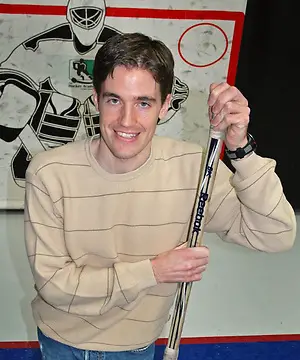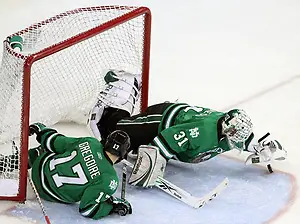Fighting Sioux fans have long argued that one piece missing from North Dakota’s team is a goaltending coach.

With former Sioux goaltending great Karl Goehring coaching North Dakota’s netminders, sophomore Aaron Dell emerging as one of the nation’s top collegiate goalies and the team poised for a run at an eighth NCAA championship, the fans could be on to something. Goehring wouldn’t disagree with them.
“I’m certainly very biased, but I think every team should have a goalie coach,” he said. “There are certain things that only as a goaltender you can have an appreciation for. Taking nothing away from the guys who play other positions, how can they understand certain scenarios for a goaltender without having gone through it?”
After graduating from North Dakota in 2001, Goehring signed a contract with the NHL’s Columbus Blue Jackets. He spent most of his eight years in professional hockey playing in the AHL and was a goalie coach for a season with the league’s Syracuse Crunch. He returned to Grand Forks last summer to serve as director of the Hockey Academy, a development program for players of all ages operated by Ralph Engelstad Arena.
That also gave him the opportunity to serve as a volunteer coach for North Dakota. When not running the academy, he works several times a week with Dell and the other Sioux goalies, Brad Eidsness and Tate Marris.
“It’s been so much fun working with such a good coaching staff and learning from them,” Goehring said. “These players, too, I can’t comment enough on their character and the goalies I’ve had a chance to work with. It’s been a blast.”
Dell’s .924 save percentage is the best of any goalie playing in the Frozen Four in St. Paul, Minn., next week. He leads the nation with a .816 winning percentage and a 1.81 goals-against average. Ironically, his impressive goals against average was exactly the same his rookie season when he was 1-3-1 with an .897 save percentage.
However, Goehring deflects credit for Dell’s improvement and considers his impressive stats this season a reflection of how well the team is playing in front of him.
“Aaron’s done a great job — regardless of the situation — just coming to play his game and focusing on what he needs to focus on,” he said. “All the credit really goes to him in terms of his preparation and what he’s done up to this point.”
From 1997 to 2001, when Goehring wore the kelly green and white for North Dakota, he was a two-time All-American goalie whose name appears at or near the top of nearly every goaltending category in the school’s record book. He was also the goalie for the last Sioux team to win a national championship in 2000.
Sioux coach Dave Hakstol said that having Goehring serve as a volunteer goalie coach has been an integral part of the team’s success this season.
“The importance of it is almost immeasurable to have a coach for the goaltender position,” he said. “He’s not just a guy who was very successful at the position, but he also has the demeanor to be an excellent communicator and teacher. It’s been very important for our goaltenders and for our team.”

At the start of the season, Eidsness, a junior, appeared poised to be North Dakota’s top goalie. He had a 48-22-8 record over his first two seasons, helping the Sioux win the WCHA championship in 2009 and the league’s Final Five tournament championship in 2010. He made the conference’s all-rookie team as a freshman and the All-WCHA second team as sophomore.
When Eidsness struggled early this season, Dell stepped in and steadily improved as the season progressed. His 30-win season eclipsed the school record set by former Sioux goalie and NHL great Ed Belfour in 1987 on a national championship team.
A native of Airdrie, Alberta, Dell spent two seasons with the Calgary Canucks of the Alberta Junior Hockey League before joining North Dakota last season. Goehring wasn’t surprised when Dell stepped into the role of starting goaltender.
“I think the ability has always been there,” he said. “It’s a transition when you’re coming from juniors to college. It’s not only a step up play-wise, but lifestyle-wise, too. There are a lot of adjustments to go through. I think getting through that first year really helped Aaron mature a lot. Getting an opportunity to play some more games helped him get into a little bit of a rhythm and get some confidence going, too.”
While Goehring is hesitant to classify Dell’s playing style, he said one factor that makes him so difficult to beat is his positioning.
“One of the fundamentals I try to teach my guys is good positioning,” he explained. “I think Aaron does an excellent job at it. If you can keep things simple and get yourself in good position, it just makes the game a lot easier.”
Dell developed his own technique to maintain good positioning, which often enables him to stop shots he doesn’t see. It may not be a spectacular style, but it is effective.
“When I was younger, I was pretty small for most of my career,” he said. “I worked on positioning a lot since I was about 15. I try to draw an imaginary straight line from my chest to the puck and try to stay as big in front of it as I can.”
Dell is tied for the nation’s lead with six shutouts. If not for two-tenths of a second at the end of the first period in last Sunday’s NCAA Midwest Regional final against Denver, he’d own that statistical category, too. But the Pioneers’ Jason Zucker, the WCHA’s rookie of the year, scored Denver’s lone goal by deflecting the puck in off Dell’s skate just before time expired to make it a 1-1 game.
“It was such a weird play,” Dell recalled. “The first shot went off my guy and by the net. [Zucker] just happened to be coming around at that time and one-timed it at me. There wasn’t a whole lot I could do about it. Guys like that always find a way to get goals.”
Many wondered how giving up a late goal would affect Dell and the Sioux. The answer came in the next two periods, when the Sioux scored five straight goals and gave up none in a 6-1 victory that sent North Dakota to the Frozen Four. For giving up just one goal in two games, Dell was named most outstanding player of the regional tournament in Green Bay, Wis.

That demonstrated another strength Dell has displayed throughout the season: an ability to remain unflappable in any situation.
“Regardless of what’s happening around him, Aaron keeps a focus and a clear mind on what he needs to do,” Goehring said. “I’m always impressed when other teams are charging the net, which they’ll do to get a goalie off his a game. Aaron will just coolly skate to a corner and regroup himself, where a lot of times you’ll see other goalies throwing blockers and getting into the mix. He just takes himself out of the situation and gets back to where he needs to be mentally.”
Dell says that his in-game concentration was something he tried to improve during the offseason.
“A big part of what I worked on over the summer was making sure that I stayed focused at all times, just not let there be any lapses in what I’m thinking about,” he said. “Each shift, I’ve got to treat it like it’s the last shift of the game and we’re tied. With playing top teams now, there’s no room for error. It’s going to come down to who makes the fewest mistakes at the end.”
To relax in his spare time, Dell plays the guitar.
“I’ve been playing since I was about 11 years old,” he said. “I like a little bit of everything. I play a little bit of classic rock and a little bit of country here and there, and some newer heavy metal stuff.”
On the team’s “Brad Miller Time” YouTube video feature regularly hosted by Sioux players Mario Lamoureux and Brett Hextall, Dell’s cluttered bedroom was featured on a “hoarders” episode.
“It was actually the day my girlfriend got back from winter break,” he said. “We just dropped off all her stuff in my room and went out to eat. They came during the time that I was gone. It wasn’t great to start with, but it looked a lot worse than it normally was.”
While some might not appreciate having their less-than-tidy personal living space broadcast to the world, Dell took it in stride. “It’s all in good fun,” he smiled.
Heading into the Frozen Four, Goehring will try to draw on his experience to help North Dakota’s goalie. Not only does he know what it’s like to win a national championship, but he also knows what it’s like to be on the losing end. In 2001, Boston College defeated the Sioux 3-2 in overtime to claim the NCAA trophy.
“More than anything, I try to be an ear for the guys to talk to about things and bounce ideas off of,” Goehring said. “Just to have somebody there that they can relate to and who knows what they’re going through and work with them through the process. I know from my own experience that having a goalie coach helped me tremendously in the professional ranks.”
Although the season has not gone as he’d planned, Eidsness believes the addition of Goehring to the coaching staff has been a plus.
“Certainly one of the strengths of the program here is guys are proud of where they’ve come from and they want to come back,” he said. “It’s been nice having Karl here and we’ve done really well as a team this year. So I think it’s helped in a lot of respects.”


